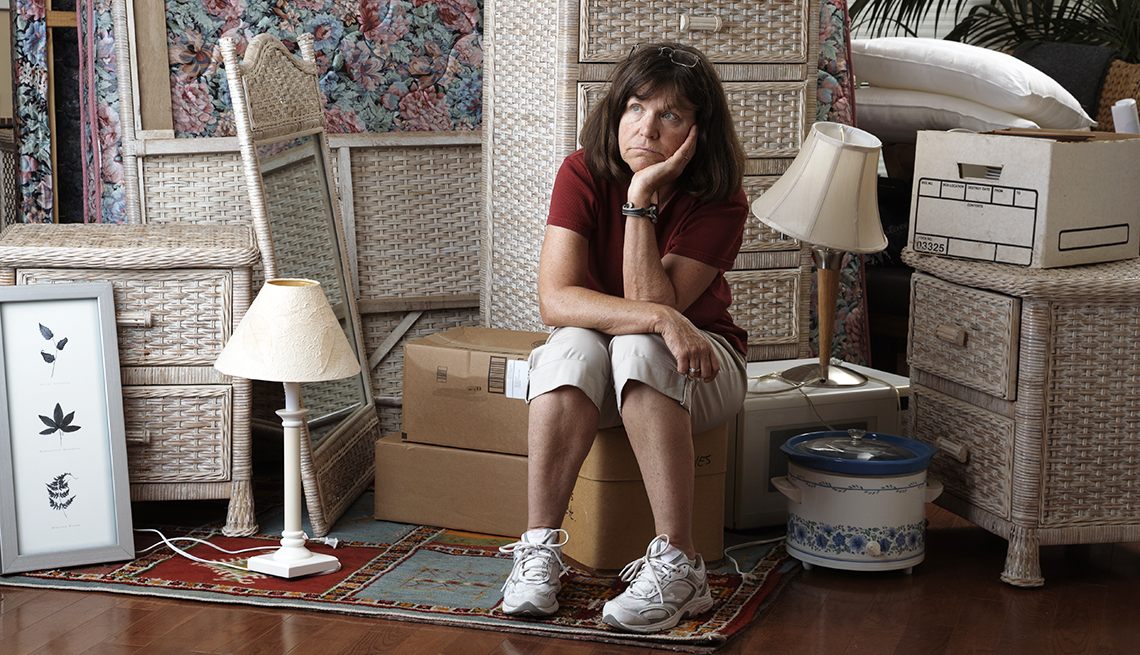
How to cope with downsizing your home
- Select a language for the TTS:
- UK English Female
- UK English Male
- US English Female
- US English Male
- Australian Female
- Australian Male
- Language selected: (auto detect) - EN
Play all audios:
Gael Conrad, Corbis / Getty Images Plus En español | The nest is empty, the mortgage is paid off and you're thinking of moving to a smaller home. Wherever you go — across the country or
across town — retirees, or those headed toward retirement, will not be alone in seeking change. In fact, almost 4 in 10 retirees have moved, according to a 2018 Transamerica Center for
Retirement Research report. And among retirees that made a recent move, 51 percent downsized, according to a Merrill Lynch study. Downsizing and dismantling a home filled with possessions
from the past 20 or 30 years can be emotionally difficult, experts say. "Items can be sentimental or there can be some other important meaning to them,” says David Mischoulon, director
of the Depression Clinical Research Program at Massachusetts General Hospital. Just finding old cards or letters can trigger memories that overwhelm, experts say. Though downsizing is not an
area that's been formally studied, it is a life transition. . "There are certain developmental milestones as we go through life,” says psychiatrist Gary W. Small, founding
director of the University of California at Los Angeles Memory Clinic and director of the UCLA Center on Aging. Finding a livelihood, finding a mate and having a family are among them. “For
a large part of our life we're building, creating, amassing,” Small says. “When we're downsizing we're going in the opposite direction. We don't need as much space;
there's an empty nest.” AP Photo/Richmond Times-Dispatch, John Mahoney TUNE INTO A TWO-PART WEBINAR FROM AARP ON AUG. 13 AND 15 AT 7 P.M. ET. with clean-up expert and TV personality
Matt Paxton, featured on the A&E series_ Hoarders. _PART 1 covers managing emotions we attach to physical items. PART 2 focuses on locating important documents and how to declutter
digitally. Changing direction can create unease or feelings of sadness, grief, even anxiety. “Your life is contracting,” Small says. “A lot of people don't like that." If the move
is a good one, the transition and feelings that go with it will be faster, Mischoulon says. There are ways to think about the process that can make it easier, even exciting. For example, if
you “think of downsizing as a new adventure,” Small says, you are more likely to enjoy it. Being part of the process is the key to a good outcome. Downsizing tends to be more successful when
the downsizers are making a conscious decision about how they want to live their lives. In your 60s, “there is still a lot of life left,” says gerontologist Mary Kay Buysse, executive
director of the National Association of Senior Move Managers, a membership organization that helps manage transition trauma and the downsizing and relocation process. “At 88, there's
less of a choice,” she says. “It's almost always a mandate. The ‘choice’ piece is an important part of the success” of a move. GUIDELINES FOR A SMOOTHER TRANSITION TO A SMALLER HOME *
RECOGNIZE YOUR FEELINGS, WHATEVER THEY ARE. “Talk to a friend or if that doesn't work, speak to a counselor,” Small says. The feelings that surface could be some unresolved conflict
from your past, he says. Maybe when you were a child your family was constantly moving, and you lost friendships in the process. While downsizing, that unresolved conflict can resurface.
“Identify it and understand it.” That “detoxifies” the feeling, he says. * FOCUS ON WHAT YOU'LL GAIN RATHER THAN WHAT YOU'RE LOSING. For example, if you sell your home, and move to
an active lifestyle community with an indoor and outdoor pool, pickleball courts, and an art studio, become involved in new activities and interests rather than dwelling on the past. *
WHILE SORTING, ENLIST HELP FROM A FAMILY MEMBER, TRUSTED FRIEND OR PROFESSIONAL. “They're more objective,” says Mischoulon. “They don't have the same sentimental attachment,” and
can help you stay focused on the task rather than just the memories and your feelings. * START WITH THE LEAST EMOTIONAL AREA OF YOUR HOME FIRST. “The kitchen can be a well of emotions,”
Buysse says. Leave enough time. “You don't want to have any regrets,” she says. You want to touch everything. People find money in “all kinds of nooks and crannies” when they sort their
possessions, she says. Though downsizing can bring painful memories to the surface, finishing the task brings its own satisfaction. "The sensation of freedom is quite powerful,”
Mischoulon says. “That will be the reward at the end of the road." MORE ON DOWNSIZING DECISIONS * Get rid of papers; what to keep, shred or scan * 20 Tips to declutter your home *
"Downsizing The Family Home: What to Save, What to Let Go," an AARP book